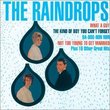| All Artists: Hector Berlioz, Leonard Bernstein, New York Philharmonic Title: Bernstein Century - Berlioz: Symphonie Fantastique, etc. Members Wishing: 0 Total Copies: 0 Label: Sony Release Date: 5/18/1999 Genres: Special Interest, Classical Style: Symphonies Number of Discs: 1 SwapaCD Credits: 1 UPC: 074646096826 |
Search - Hector Berlioz, Leonard Bernstein, New York Philharmonic :: Bernstein Century - Berlioz: Symphonie Fantastique, etc.
 | Hector Berlioz, Leonard Bernstein, New York Philharmonic Bernstein Century - Berlioz: Symphonie Fantastique, etc. Genres: Special Interest, Classical
Track 6 features Bernstein's narrated tour through this eccentric, groundbreaking symphonic masterpiece. Sadly, the conductor's pithy analogy between Berlioz's musical depiction of opium-inspired visions and the dangers of... more » |
Larger Image |
CD DetailsSynopsis
Amazon.com Track 6 features Bernstein's narrated tour through this eccentric, groundbreaking symphonic masterpiece. Sadly, the conductor's pithy analogy between Berlioz's musical depiction of opium-inspired visions and the dangers of a contemporary trip ("brilliance without glory") remains as timely now as it was in 1968. Brilliance and glory, however, characterize the conductor's 1963 recording, reissued here for the first time on CD. The orchestral execution is not as fluid or well-oiled as it would be for Bernstein's 1968 remake, but slightly closer micing reveals a wealth of color, nuance, and dynamic differentiation absent from the original LP. Passages leap from your speakers with sparkling clarity. The conductor illuminates the composer's innovative orchestral combinations with a kind of urgency that lapses into bombast only in the frenzied final measures. And why not? An absorbing, excellently remastered release. --Jed Distler Similar CDs
Similarly Requested CDs
|
CD ReviewsFantastic "Symphonie Fantastique". Louie Bourland | Garden Grove CA | 03/05/2005 (5 out of 5 stars) "Long before the days of psychedelic rock and the prog-rock concept album, there was "Symphonie Fantastique" composed in 1830 by the great Hector Berlioz. Even after its inception 175 years ago, the "Symphonie Fantastique" is regarded as a milestone not just in classical music but in all areas of music. Considering the time period in which it was created, the music, ideas and concept were way ahead anything else that was being done (except for maybe Beethoven who had died only three years before Berlioz completed this work). The concept behind "Symphonie Fantastique" is an extraordinary one. A young musician falls in love with a beautiful woman but can't have her. So he poisons himself with opium in hopes of killing his pain (and himself). Instead of dying, the musician falls into a hallucinegenic sleep in which he has surrealistic dreams - all of which involve the woman in question. The beloved one is represented by a simple yet haunting theme which is heard in numerous variations throughout the work's five movements. Although, the symphony does not have any words, it isn't difficult to picture the scenery in which each movement takes place and it's also not difficult to sense the intrusion when the beloved's theme occurs each time throughout the work. The first movement sets the pace for the entire work with a majestic Beethoven-like theme along with the aforementioned theme of the beloved. The second movement depicts a giant ballroom with a danceable Strauss-like waltz interupted by the same theme. The third movement takes place in an outdoor countryside and is an overall pleasant piece. The beloved's theme here sounds like a rude intrusion in contrast to the calmness. The fourth movement, "March to the Scaffold", is a dynamic tour-de-force in which the troubled musician imagines he is being executed for killing his beloved. Finally, the last movement, "Dream of the Witches Sabbath", is a hellish nightmare in which the musician imagines he's dead in hell surrounded by witches, demons and evil spirits (this was before heavy metal). The chilling haunting quality of the music is perfectly executed. Its use of violins bowing the strings with the opposite end of the bow is especially affective in creating the bone-rattling goulish sounds heard towards the end of the movement. Indeed, as mentioned above, Berlioz's "Symphonie Fantastique" was way ahead of its time when it was created. In a strange way, it does include elements of psychedelic music (the hallucinegenic theme of the work), prog (the fact that the five movements do indeed form a cohesive whole) and metal (the musical depiction of demonic things). And this was way back in the early 19th century. On this disc, Leonard Bernstein not only does a flawless job at presenting this work, he also gives an excellent illustration of it in his discussion "Berlioz Takes A Trip" which is heard on Track 6 of this CD. Here, Bernstein dissects the piece musically and conceptually, allowing the listener to take a peek into Berlioz's obsessive mad genius. The remastered sound quality is also amazing giving the entire work a fresh clarity. So there you have it, the first fruits of Psychedelic Prog-Metal all rolled into one musical work created 175 years ago by a brilliant composer by the name of Hector Berlioz. Definitely a Symphonie Fantastique." Definitive = typical?and how to really annoy others kv581 | 01/08/2003 (5 out of 5 stars) "The final movement is on Kerman's "Listen" cd accompaniment to his textbook. At least, that's the first place I heard it.Supposedly, the Davis recording is the definitive performance. Meaning if you want a reference tool, that's what everyone compares every performance afterwards to. As in, "well, it wasn't as good as the Davis Concertgebouw..." (see title of my review) Don't let that scare you away from different interpretations. Bernstein shines in the final two movements of this "Symphony Fantastique" performance. Considering these are the most commonly known parts to the symphony, and in my opinion the most entertaining, there's no reason why one can't enjoy the fine job Bernstein did on them.The bombastic nature of the final "Dream of the Witches Sabbath" movement is nothing short of brilliant in creating a purgatory-ish enviornment. I've never been to hell myself - though I have been told by some to take a visit - but I'd imagine if I had to describe it in the context of a program symphony... it'd be a big bad rip-off of the Berlioz Witches' Sabbath movement here.Anyhoo, if you're a fan of this work, Bernstein's interpretation of the IV & V movements are breathtaking, and appropriately so. (Honestly, I always laugh at the last morbid moments of the IV movement. What with the juxtaposition of sudden... well... tumbling... and joyous horns.) That isn't to say the other three movements aren't any fun to listen to, but the last two stand out in this recording. By far this is the biggest, and best controlled, version I've ever heard, and I've heard quite a few good ones, and a few that are disgraceful and should only be used by means of torturing in bad taste.Or, if you're looking for some interesting "classical" music, STEP AWAY FROM THE YANNI or lame wannabe Debussys... also that non-stop italian singing in Opera may be a bit much for you right now. Just perk up to the last track of this cd, where Bernstein explains the piece, and, in precise detail, Berlioz's notes for understanding what's going on in this explicit program symphony. It's not too hard to follow, and actually quite enjoyable while attentively listening. The Symphony I mean, Bernstein's voice scares me to no end. (kidding!)On a final note, the low string scrapings on the second round of the "Dies Irae" parody seems to annoy unwitting (and probably unintentional on their part) listeners much more than any heavy metal song does. "Master of Puppets" wishes it could be as dark and grating as the Witches Sabbath. Try blaring it sometime to release tension, or when you're feeling especially masochistic. Fun for all ages!" Good performance plus bonus track! kv581 | Durham, NC United States | 04/02/2000 (5 out of 5 stars) "This performace must be among the better renditions of the Symphonie out there. Sir Colin Davis, of course, has the reputation of being THE Berlioz conductor (and his Concertgebouw recording is usually considered to be THE reference recording), but there is nothing wrong with alternative interpretations. In any case, Bernstein, with his Mahler expertise, was certainly no stranger to grandiose music. Besides, you also get the excellent bonus track where Bernstein's narration takes you into the music and helps you understand. This CD is a great place to get started with the Berlioz masterpiece. Perhaps you'll opt for the widely popular Davis recordings later, or maybe you'll eventually prefer the period instrument recordings by Norrington or Gardiner. Meanwhile, though, make a safe investment in this CD. It will not disappoint."
|

 Track Listings (6) - Disc #1
Track Listings (6) - Disc #1












